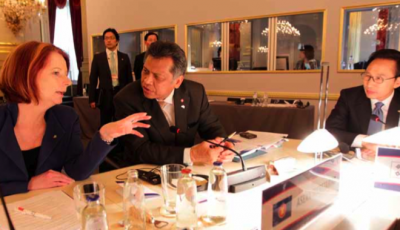The new forum should not attempt to compel participants to make specific policy decisions. But a voluntary process of cooperation can be effective if it concentrates on just a few vital issues and is able to achieve a perceptible policy convergence on how they are addressed. Orchestrating a coordinated response to the global financial was important, but at least two urgent issues remain: international macroeconomic rebalancing and limiting climate change.
A more sustainable pattern of global demand and supply will not be achieved easily. It will need structural reforms to change incentives for saving and investment in all economies. A consensus is emerging for strengthening both domestic and international safety nets. The International Monetary Fund has already launched a Precautionary Credit Line (PCL) to reduce the need for large national foreign exchange reserves.
It will be harder to establish consensus on sharing the burden of limiting greenhouse gas emissions, where short-term national interests diverge and negotiations will be hard.
After the disappointment of Copenhagen, eyes are turning to the G20, but that is not the place for negotiations. If G20 leaders failed to negotiate policy convergence, the forum would lose credibility; if they succeeded, the forum would risk losing legitimacy as the rest of the world questioned its right to negotiate on their behalf.
A more viable approach is to focus on principles and modalities for getting climate change negotiated globally. These might include: reaffirming the shared commitments to limit temperature rise to 2 degrees; financial incentives for producers and consumers to adopt less carbon-intensive habits; and convergence toward equal emissions per capita by an agreed date, such as 2050. Endorsement of these guidelines would increase the prospect of successful negotiations in existing and accepted international organisations.
A principles-based approach, ideally backed by setting positive examples and cooperation in policy development, can be applied to other issues. While acknowledging that the slow pace of reforms on any issue are limited by domestic political realities, G20 participants can exert peer pressure to implement policies in line with guiding principles. They can commit to frank reporting — to each other, not for communiqués — on what they have been able to achieve and to share their experience of successes and setbacks.
The G20 will also need to help raise living standards for economies not at the table. The challenge is to make it possible for all economies to follow the examples set in East Asia where many economies have integrated in the global trading system and reduced poverty substantially. The key is ever-deeper engagement in global production networks, while avoiding over-reliance on external demand. Individual governments bear most of the responsibility for implementing the reforms that are needed to achieve this outcome, but the G20 can help in at least two significant ways.
One of these is to promote international commerce based on the fundamental international economic insight that products and factors of production should be compared on the basis of price and quality, not on the ownership or location of suppliers. The remarkable sustained increase in prosperity of the past 60 years could not have been achieved in a world split into rival trading blocs. Looking ahead, the structural adjustments needed to accommodate the rising productivity of China and India, and others, cannot be achieved in less than a global economy. The world cannot afford the current drift towards discriminatory trading.
Shoring up core World Trade Organisation rules and disciplines is now far more important than reducing the few remaining traditional border barriers to trade. The G20 needs to reset a tight deadline for winding up the Doha Round, without expecting significantly more than what is already agreed. We have to pursue the challenge of facilitating deeper economic integration in a world where international commerce is no longer dominated by trade in goods whose ‘origin’ can be meaningfully defined.
A second way to help all economies to engage global production networks is to mobilise the financial resources needed for massive investment in economic infrastructure, especially transport and communications links. The investments needed greatly exceed what can be expected from grants or soft loans. The G20 can encourage the policy developments that would allow attraction of funds to infrastructural investment via global capital markets. There is a wealth of good and bad experience about financing infrastructure to be shared in getting this right.
These few agenda items need urgent attention, working alongside already existing multilateral and regional bodies. The G20 should resist the temptation either to dodge them, or to add more to its load until it has been able to persuade its members to agree on the principles that will lead to coherent action on these important matters
Andrew Elek is a Research Associate of the Crawford School of Economics and Government, Australian National University, and previously served as Chief Economist of the Australian Government’s Economic Planning Advisory Council.
This is an article from the most recent edition of the East Asia Forum Quarterly: ‘Asia and the G20’.

